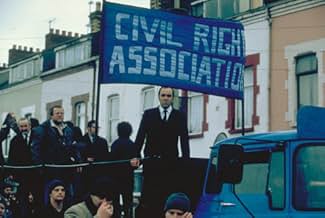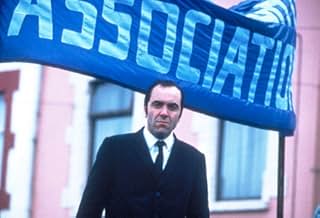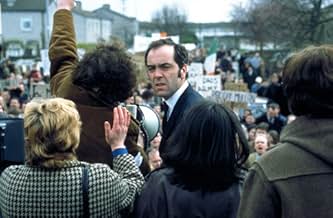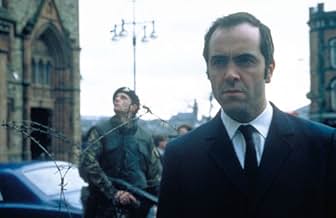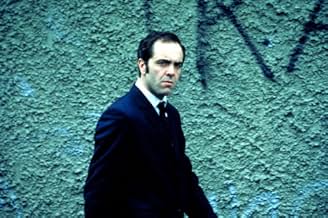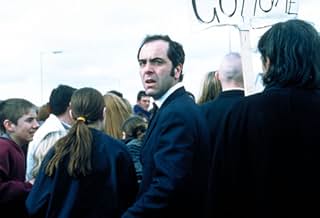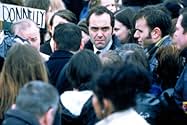Una drammatizzazione della marcia di protesta per i diritti civili irlandesi e il successivo massacro delle truppe britanniche il 30 gennaio 1972.Una drammatizzazione della marcia di protesta per i diritti civili irlandesi e il successivo massacro delle truppe britanniche il 30 gennaio 1972.Una drammatizzazione della marcia di protesta per i diritti civili irlandesi e il successivo massacro delle truppe britanniche il 30 gennaio 1972.
- Ha vinto 1 BAFTA Award
- 19 vittorie e 23 candidature totali
- Bridget Bond
- (as Carmel Mccallion)
- Maj. Steele
- (as Chris Villiers)
Recensioni in evidenza
The acting, especially James Nesbit is excellent, the recreation of the mood is superb although it was obvious with the constant close ups that there was very little budget to recreate the scenery. The geography was never explained and therefore would leave a viewer without prior knowledge of the area disorientated.
The documentary suffered from not being able to set the scene, a lot had happened in the week prior to the Civil Rights march that put both the participants and the security forces on edge and made the advance more significant. The question of why the Paras were sent to Derry were never fully explored.
Overall it was flawless recreation of events from the point of view taken by the film makers on this particular incident. It is worth noting that this is based on the Irish Governments review of the Widgery report into Bloody Sunday. (NB the Widgery report is mostly considered by nationalists to be a white wash)
The film jumps so frequently from scene to scene that at times it is distracting, though I was much less annoyed by this the second time around. And, having seen it once with and once without subtitles, I must say that although the subtitles (optional on the DVD) are intrusive they are quite welcome. I love the Irish accent but at times it can be difficult for me to decipher,and much of the dialogue in the movie is muted. It was good to know what was being said.
As for the objectivity, of course the movie is slanted - so was the situation. But it is not unreasonably slanted. The British are not shown as one-dimensional demons - in particular, Nicholas Farrell does a great job of conveying Brigadier Mclellan's ambiguity and even disapproval of the course taken against his wishes by the supposed "Observer," Maj. Gen. Ford (who, if the movie has a villain, is the prime candidate.) At one point early on several Paras are discussing the day's prospects, and reveal how tired they are of being harassed, shot at and otherwise abused by the native population. This makes the day's events more understandable. This does not EXCUSE the cold-blooded gunning down of 27 people - there is no excuse for that - but at least one can see a contributing factor. And protesters are shown, once or twice, firing back. (The key here is firing BACK - evidence indicates that no marchers fired until the first two protesters were wounded. And those scattered few that attempted return fire were quickly dissuaded by their countrymen. Later in the day the IRA did go into action, but not until after the bloodletting in Bogside was over with.) Ivan Cooper's (James Nesbitt) words at the close of the film were shown to be all too true in the years since the actual incident. The IRA was on unsteady legs at the time, but has never lacked support since January 30, 1972.
The film is a powerful object lesson concerning the misuse of force, and one that governments everywhere - including my own country, the United States - should take to heart. It has a few flaws, but I think deserves the awards it has received. 8/10 points.
being born protestant, i have little use for the cowardly, yet brutal and malicious, mutation of the provisional ira; under the helm of gerry addams.
being born sentient, i have little use for the fire and brimstone polarisations; counterspin and half-truths of ian paisley.
being born human, i have empathy for the slain.
the bloody Sunday massacre in derry, was a tragic testament to man's blood-lust, fueled by fear and adrenaline. the events depicted in the movie "bloody Sunday," provide an arresting portrayal of a tacitly monumental aspect of modern ulster history. the portrayals of the people and the events maintain an objective testimony toward a tragedy that is both sobering and inexcusable.
"bloody Sunday" takes no sides, and distributes no blame. it simply reenacts the events as they were recorded, and lets the viewer make his or her own decisions.
if you are familiar with the conflict; if you are distressed by man's inhumanity unto himself; if you are simply interested in a detached account of history; this is an important film to see.
Lo sapevi?
- QuizTo make this movie as authentic as possible, no lights were used in the movie and the camera work was entirely hand-held
- BlooperThe marchers carry homemade cardboard signs with slogans written on them. When shown from behind, some have modern printing ("Made in China") on them that are not appropriate for 1972.
- Citazioni
Ivan Cooper: I just want to say this to the British Government... You know what you've just done, don't you? You've destroyed the civil rights movement, and you've given the IRA the biggest victory it will ever have. All over this city tonight, young men... boys will be joining the IRA, and you will reap a whirlwind.
- Curiosità sui creditiThe live rendition of U2's Sunday, Bloody Sunday continues to play for a full three minutes over a black screen after the credits finish rolling.
- ConnessioniFeatured in The 2003 IFP Independent Spirit Awards (2003)
I più visti
Dettagli
- Data di uscita
- Paesi di origine
- Lingua
- Celebre anche come
- Domingo sangriento
- Luoghi delle riprese
- Aziende produttrici
- Vedi altri crediti dell’azienda su IMDbPro
Botteghino
- Budget
- 2.000.000 £ (previsto)
- Lordo Stati Uniti e Canada
- 773.228 USD
- Fine settimana di apertura Stati Uniti e Canada
- 29.419 USD
- 6 ott 2002
- Lordo in tutto il mondo
- 1.758.689 USD
- Tempo di esecuzione
- 1h 51min(111 min)
- Colore
- Mix di suoni
- Proporzioni
- 1.85 : 1

